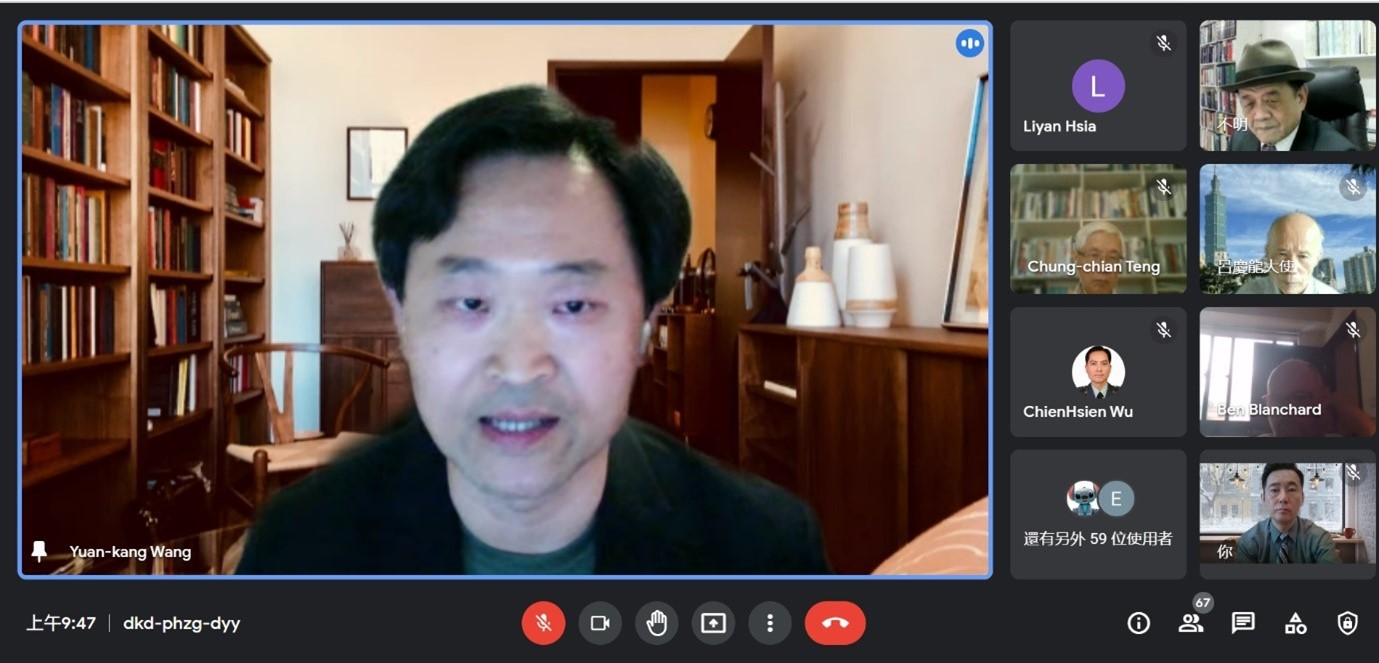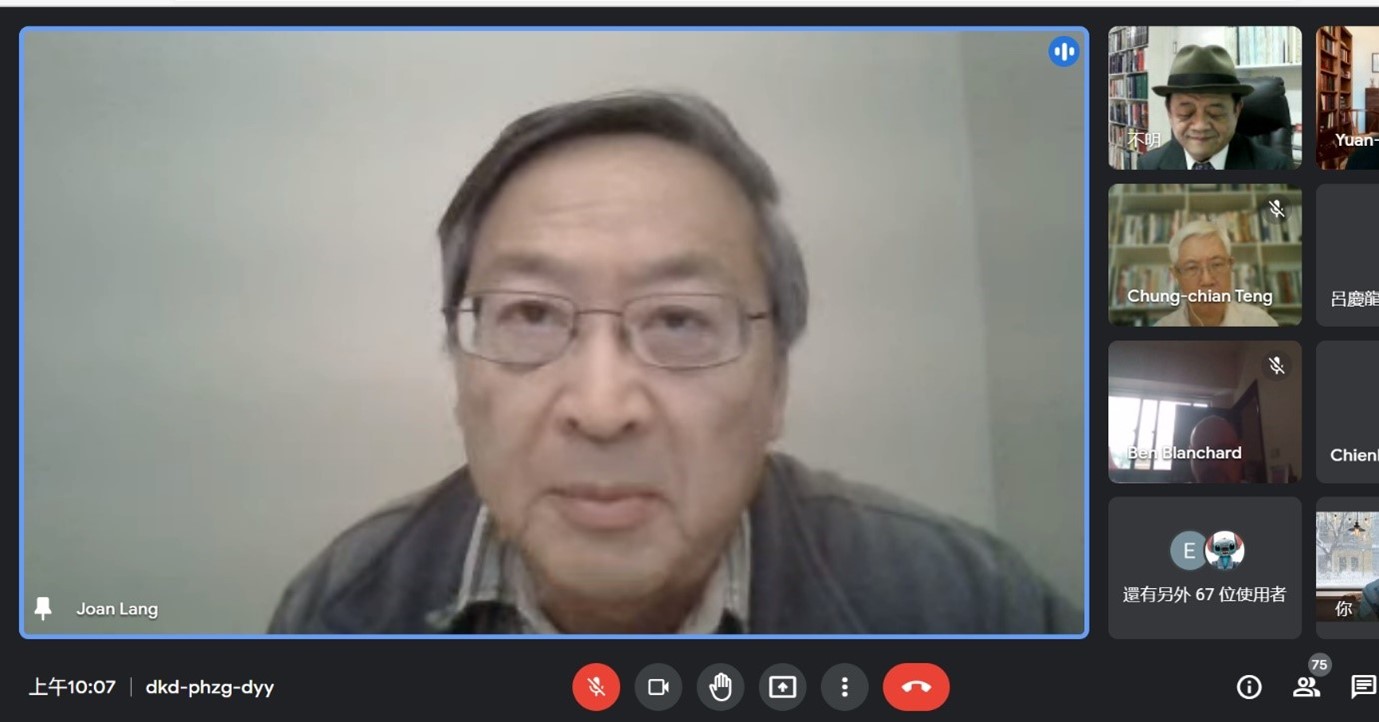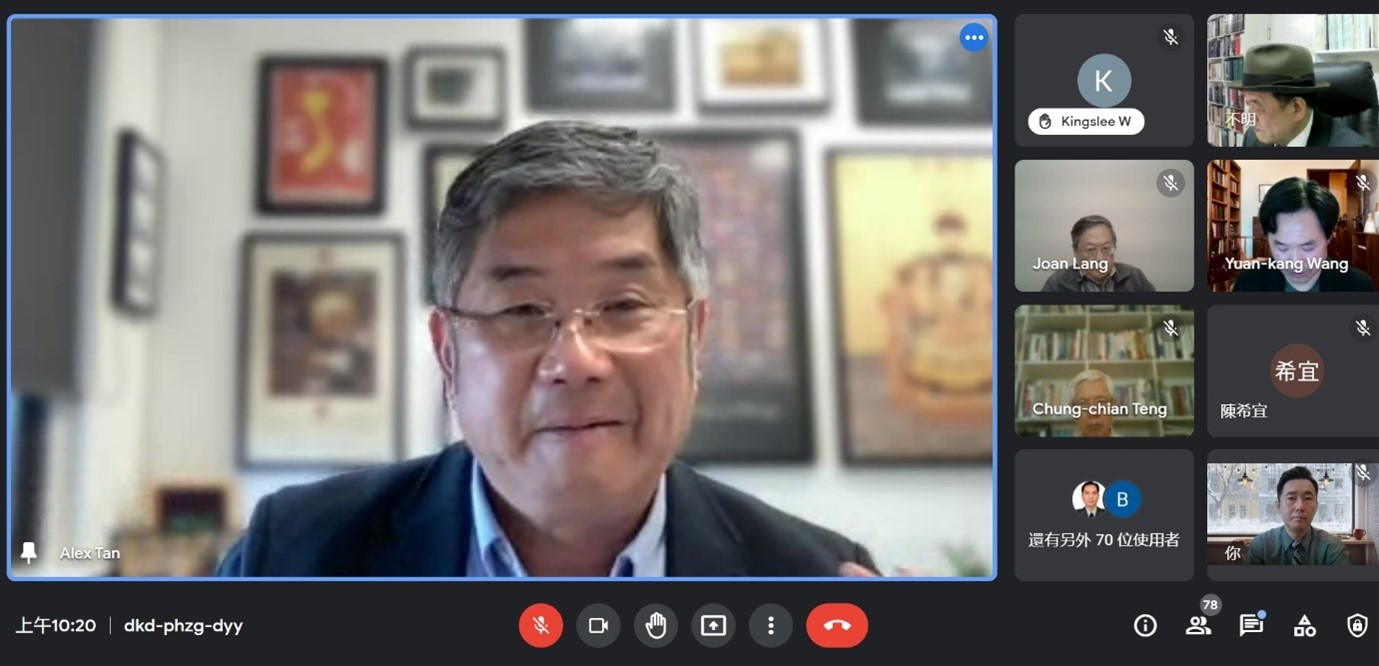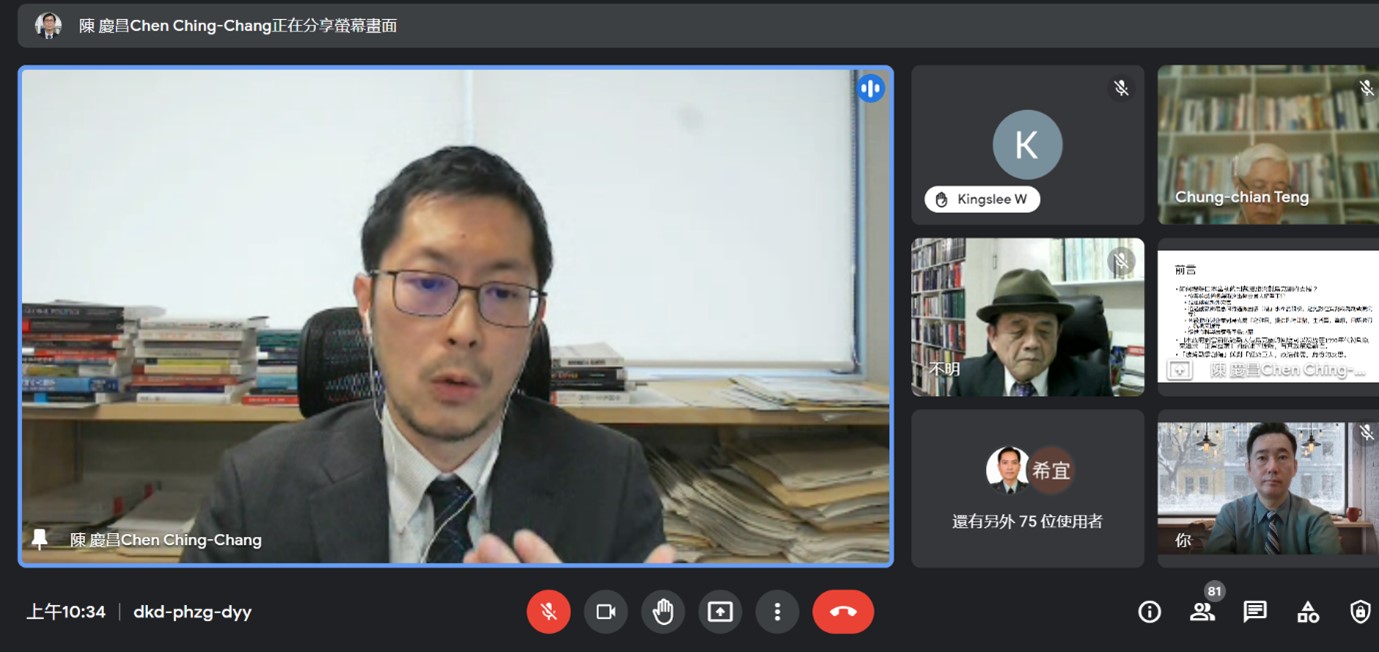News
Association of Foreign Relations
Forum on East Asia under the Russo-Ukrainian Conflict
Friday, April 29, 2022, 9:30 am – 11:20 am
online
Opening remarks by
Andrew Hsia, Chairman of the Association of Foreign Relations
Hosted by
Huang Kwei-bo, Professor of the Department of Diplomacy, National Chengchi University & Secretary-General of the Association
Keynote Speakers
- Wang Yuan-kang (Professor of the Department of Political Science, Western Michigan University)
- Bert J. Lim (President of the World Economics Society)
- Tsung Chi (Professor and former director of the Department of Politics, Occidental College)
- Alex Tan (Professor of the Department of Political Science and International Relations, University of Canterbury)
- Ching-Chang Chen (Professor of International Politics in the Department of Global Studies and Director of the Global Affairs Research Centre)
This forum convened experts from both academic and private sectors to hold a discussion that focused on the impact the Russian-Ukrainian armed conflict has on the political economy of Taiwan and the greater East Asia.
Professor Wang Yuan-kang cautioned that the U.S.-China relationship under the conflict between Russia and Ukraine has caused the U.S. to shift its attention from East Asia to Europe, giving China a period of strategic opportunity. In addition, the East and the West have also entered the "Cold War 2.0", and the unipolar system in the post-Cold War period is coming to an end. Besides the United States’ confrontational relationship with China and Russia, the polarization of US-China relations also includes ideological factors. Regardless this stems from a systemic dispute or the Western countries' defense of democracy, Russia has initiated an armed conflict in confronting NATO’s expansion eastward. This has led to security dilemmas for many countries.
President Bert J. Lim analyzed the economic influence that the United States hopes to see in light of this situation. First, the US is looking to obtain ahold of the world’s energy price control, which can result in the sustenance of its leadership in the energy market. Second, the US hopes that foreign capital can flow back to their country However, energy pricing has not yet been settled, and most of the capital outflows have been transferred to Asia instead, and even to mainland China. Therefore, the reduction in the competitiveness of Asian countries is the outcome of rising commodity prices from the war, which has increased the overall production and sales costs and led Asian countries to lose their advantages in the global supply chain. President Lin expects that in the future, the currencies of East Asian countries will face a wave of competitive devaluation, and interest rates will continue to rise.
Professor Tsung Chi talked about East Asian security from the triangular relationship’s perspective. He explained mainland China thinks the US is caught in the quagmire of Europe, leaving them no time to look east, the US-China relations will see the East rise and the West decline. In this conflict, Russia will be weakened, and in turn, the US strengthened while mainland China gains greater discourse power. Under unstable factors that underpin security, defense budgets and arms races among countries will grow. Most of China's outsourced weapons systems come from Russia, but Russia's arms exports may be affected for a long time in the future amid US sanctions, which will also affect China's military equipment supply. The progression of this conflict, paired with the leaders’ factors that come into play, leaves an uncertain future yet to be observed.
Professor Alex Tan pointed out that some people believe the conflict between Russia and Ukraine was shaped by the United States. He further mentioned that this is also a conflict between the interests and values of the major powers. This is shown in the predicament of central banks in most countries that are suffering from severe inflation. When the economic foundation is weak, monitoring and operating monetary procedures become more complex. In terms of the conflict’s impact on trade, supply and demand, rising commodity prices, and how the economy influences regional stability are all topics worth discussing. When it comes to the motive of the US, a country that appears to be oriented more toward its interests than its values. It was Vladimir Putin's personal decisions in response to U.S. interest-oriented diplomacy, rather than an ideological confrontation between democracies and totalitarian states, that led to the invasion of Ukraine. Finally, Professor Tan expressed that the economic growth of the Asia-Pacific region is very important. If these issues are not properly resolved, they will spill over into a regional security issue.
Professor Ching-Chang Chen looked at the impact of the Russian-Ukrainian conflict from Japan’s point of view. The Japanese government's sanctions on Russian and aid to Ukraine, including voting in favor of Russia's expulsion from the UN Human Rights Council and expelling several Russian diplomats. In addition, regarding Japan's security policy, Japan resolves international disputes under Article 9 of its constitution, and this covers the right to collective defense. He continues to advocate a "free and open Indo-Pacific" and opposes the use of force by mainland China and Russia to unilaterally change the status quo. He also pointed out that Japan has strengthened its "risk aversion" strategy and has joined the United States in the lineup against China and Russia. If there is an incident in the Taiwan Strait and the People’s Liberation Army attacks Japanese territory, Japan is likely to send troops to aid Taiwan.
In this virtual forum, all keynote speakers observed that the leaders' decision-making styles are highly related to the overall climate that includes aspects of politics, economy, strategic security, etc. With the ongoing development of the Russo-Ukrainian conflict, many incidents under discussion will evolve. Therefore, careful analysis and evaluation must be done, but the political and economic situation in East Asia has changed, and returning the world to as it was pre-pandemic would be difficult.
Professor Wang Yuan-kang cautioned that the U.S.-China relationship under the conflict between Russia and Ukraine has caused the U.S. to shift its attention from East Asia to Europe, giving China a period of strategic opportunity. In addition, the East and the West have also entered the "Cold War 2.0", and the unipolar system in the post-Cold War period is coming to an end. Besides the United States’ confrontational relationship with China and Russia, the polarization of US-China relations also includes ideological factors. Regardless this stems from a systemic dispute or the Western countries' defense of democracy, Russia has initiated an armed conflict in confronting NATO’s expansion eastward. This has led to security dilemmas for many countries.
President Bert J. Lim analyzed the economic influence that the United States hopes to see in light of this situation. First, the US is looking to obtain ahold of the world’s energy price control, which can result in the sustenance of its leadership in the energy market. Second, the US hopes that foreign capital can flow back to their country However, energy pricing has not yet been settled, and most of the capital outflows have been transferred to Asia instead, and even to mainland China. Therefore, the reduction in the competitiveness of Asian countries is the outcome of rising commodity prices from the war, which has increased the overall production and sales costs and led Asian countries to lose their advantages in the global supply chain. President Lin expects that in the future, the currencies of East Asian countries will face a wave of competitive devaluation, and interest rates will continue to rise.
Professor Tsung Chi talked about East Asian security from the triangular relationship’s perspective. He explained mainland China thinks the US is caught in the quagmire of Europe, leaving them no time to look east, the US-China relations will see the East rise and the West decline. In this conflict, Russia will be weakened, and in turn, the US strengthened while mainland China gains greater discourse power. Under unstable factors that underpin security, defense budgets and arms races among countries will grow. Most of China's outsourced weapons systems come from Russia, but Russia's arms exports may be affected for a long time in the future amid US sanctions, which will also affect China's military equipment supply. The progression of this conflict, paired with the leaders’ factors that come into play, leaves an uncertain future yet to be observed.
Professor Alex Tan pointed out that some people believe the conflict between Russia and Ukraine was shaped by the United States. He further mentioned that this is also a conflict between the interests and values of the major powers. This is shown in the predicament of central banks in most countries that are suffering from severe inflation. When the economic foundation is weak, monitoring and operating monetary procedures become more complex. In terms of the conflict’s impact on trade, supply and demand, rising commodity prices, and how the economy influences regional stability are all topics worth discussing. When it comes to the motive of the US, a country that appears to be oriented more toward its interests than its values. It was Vladimir Putin's personal decisions in response to U.S. interest-oriented diplomacy, rather than an ideological confrontation between democracies and totalitarian states, that led to the invasion of Ukraine. Finally, Professor Tan expressed that the economic growth of the Asia-Pacific region is very important. If these issues are not properly resolved, they will spill over into a regional security issue.
Professor Ching-Chang Chen looked at the impact of the Russian-Ukrainian conflict from Japan’s point of view. The Japanese government's sanctions on Russian and aid to Ukraine, including voting in favor of Russia's expulsion from the UN Human Rights Council and expelling several Russian diplomats. In addition, regarding Japan's security policy, Japan resolves international disputes under Article 9 of its constitution, and this covers the right to collective defense. He continues to advocate a "free and open Indo-Pacific" and opposes the use of force by mainland China and Russia to unilaterally change the status quo. He also pointed out that Japan has strengthened its "risk aversion" strategy and has joined the United States in the lineup against China and Russia. If there is an incident in the Taiwan Strait and the People’s Liberation Army attacks Japanese territory, Japan is likely to send troops to aid Taiwan.
In this virtual forum, all keynote speakers observed that the leaders' decision-making styles are highly related to the overall climate that includes aspects of politics, economy, strategic security, etc. With the ongoing development of the Russo-Ukrainian conflict, many incidents under discussion will evolve. Therefore, careful analysis and evaluation must be done, but the political and economic situation in East Asia has changed, and returning the world to as it was pre-pandemic would be difficult.
/
-
Wang Yuan-kang (Professor of the Department of Political Science, Western Michigan University) -
Bert J. Lim (President of the World Economics Society)
-
Tsung Chi (Professor and former director of the Department of Politics, Occidental College) -
Alex Tan (Professor of the Department of Political Science and International Relations, University of Canterbury) -
Ching-Chang Chen (Professor of International Politics in the Department of Global Studies and Director of the Global Affairs Research Centre)








 256 bit SSL Encryption
256 bit SSL Encryption